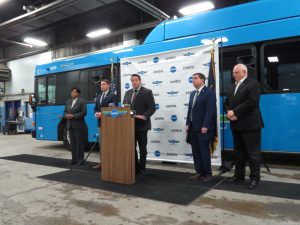In June, the U.S. Environmental Protection Agency unveiled a draft proposal to cut carbon pollution from the nation’s power plants 30 percent from 2005 levels by 2030. Although the proposed rule has been called “one of the strongest actions ever taken by the United States government to fight climate change,” it will also assuredly not […]
Get Instant Access to This Article
Become a Central New York Business Journal subscriber and get immediate access to all of our subscriber-only content and much more.
- Critical Central New York business news and analysis updated daily.
- Immediate access to all subscriber-only content on our website.
- Get a year's worth of the Print Edition of The Central New York Business Journal.
- Special Feature Publications such as the Book of Lists and Revitalize Greater Binghamton, Mohawk Valley, and Syracuse Magazines
Click here to purchase a paywall bypass link for this article.
In June, the U.S. Environmental Protection Agency unveiled a draft proposal to cut carbon pollution from the nation’s power plants 30 percent from 2005 levels by 2030. Although the proposed rule has been called “one of the strongest actions ever taken by the United States government to fight climate change,” it will also assuredly not achieve nearly the reductions in greenhouse gases that science tells us must be attained. And the proposal has raised some valid objections from the business community.
The good news is that an alternative solution exists that does not require obtrusive and selective governmental regulations, and does not involve loophole-ridden, emissions-trading schemes. That solution is a revenue-neutral carbon tax, endorsed by such prominent conservatives as former U.S. Secretary of State George Schultz, former Congressman Bob Inglis, and Greg Mankiw, formerly chairman of the Council of Economic Advisers under President George W. Bush.
The Citizens’ Climate Lobby, a national volunteer-based organization, is advancing a carbon tax, called the “Carbon Fee and Dividend.” The proposal consists of a $15-per-ton fee on CO2 equivalent fuel sources, to increase by $10 per ton annually until specific, identified emissions goals are achieved. As a frame of reference, $15/ton CO2 equivalents translates roughly to a price increase of 15 cents per gallon of gasoline. The proposal is revenue-neutral in that the revenue generated by the fee would be rebated monthly in the form of a check to U.S. households in an amount equal to the median energy cost per household. The fee, of course, provides a market incentive for individuals to lower their consumption of carbon-based fuels throughout the supply chain.
By returning 100 percent of the fees generated back to U.S. citizens with none retained by the federal government, the proposal is “revenue neutral” for the federal budget and offsets increased energy prices for most households. The gradually increasing nature of the proposed fee is intended to avoid “price shocks” to the economy and a “border adjustment” on imports would ensure that domestic manufacturers are protected while also providing an incentive for foreign trading partners to implement an analogous tax.
The business community is probably keenly interested in what the potential effects of such a proposal would be on our regional or national economies. Setting aside the increasing costs to our economies that will surely occur as a result of unabated climate change (example: decreased agricultural productivity, storm damage, loss of coastal habitation, etc.), a recent rigorous economic study demonstrates compellingly that addressing climate change through Carbon Fee and Dividend will improve employment and economic growth both regionally and nationally.
Regional Economic Models, Inc. (REMI), a respected, non-partisan economic modeling firm, completed an economic analysis of the Carbon Fee and Dividend proposal in June of this year and the results are exciting. Implementation of a gradually increasing carbon fee with revenues returned to households will increase employment and economic growth both nationally and for the Mid-Atlantic Region (New York, New Jersey, and Pennsylvania) when compared with not implementing the proposal.
Assuming implementation beginning in 2015, REMI forecasts that by 2024 U.S. GDP will increase by $840 billion and $150 billion regionally compared to what it would be without implementing the proposal. Jobs are projected to increase over the same period by about 2 million for the U.S. and by 250,000 for the Mid-Atlantic region.
Central New York impact
While REMI’s analysis did not specifically address our 16-county Central New York region, our employment/economy breakdown is sufficiently similar to the larger Mid-Atlantic region analyzed to suggest that the results would be comparable if not better.
We often see calls in Central New York for us to transition to a “21st century economy” and invest more in technology and “green” industries. But varying combinations of top-down government initiatives, and vague references to “leadership,” are usually identified as the means for accomplishing this goal. The limitations of government for affecting such a transition, however, are widely recognized, especially when contrasted with market forces.
Climate change has been called the “greatest example of market failure the world has ever seen,” [according to the Stern Review on the Economics of Climate Change, a 2006 report done for the British government]. The carbon fee and dividend will correct market distortions that favor carbon pollution and will drive overall growth in our economy, total employment, while also serving as an incentive for investment in renewable-energy technologies in which Central New York strives to be a leader. That’s not to mention that it represents the most effective means available for addressing the existential threat that climate change represents to us and our offspring.
We in the business community should be at the forefront of embracing it.
Kyle E. Thomas is the principal engineer at Natural Systems Engineering, PLLC in Syracuse and is the group leader for the Syracuse Chapter of the Citizens’ Climate Lobby. Contact him at kthomas@naturalsystemsengineering.com



